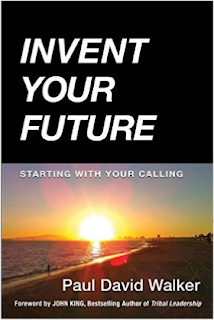Invent Your Future: Starting With Your Calling
Paul David Walker, Highpoint Executive Publishing, New York, USA, 2015
Valuable Advice . . . Taken With Discernment
Always looking for more material
for a workshop I lead intended to help people of faith find their unique
“significance” in service, I agreed to review this book. To that end, I found it served a most
worthwhile purpose but I could not swallow all the advice hook, line, and
sinker.
Author Paul David Walker has
tons of experience in helping professionals succeed. And the material for this
book flows out of his strong ability to integrate a process he very much
believes in with testimonies from some of his highly successful clients.
Much of what he recommends each
of us aim for is most necessary for success (and significance). As clearly
stated in the Foreword by John King, author of Tribal Leadership, Walker is also trying to address, “in the
background . . . the spiritual quality of leadership in the individual.” For example, we do need to Know Ourselves. We need to realize that
the greatest strength of a hurricane comes from its eye – the very element that
is the most still in the entire phenomenon; and thus we must remain calm in our
reactions and decision-making, operating from strength.
While he does not call it a
formula for “Inventing Your Future”, he does give us five critical steps – Know
Yourself (about ‘becoming your
calling’ and discovering your gifts and passion), Find the Answer (about mastering the present, embracing wisdom, and
using intuition), Paint Compelling
Pictures (about conceiving the future and creating high-impact statements),
Building Commitment (about inspiring
everyone, seeing and feeling possibility, and tapping into imagination and
intention), and Responding to Reality
(about responding to present reality, cultivating intention and purpose, and
gathering the courage to act). A sixth step is really one that is
fundamental to all the others and is undertaken simultaneously and throughout
the process, namely Mastering Inner Stillness
(about achieving ‘command presence’ and getting into the zone).
While most of the book’s other
reviewers couldn’t say enough nice things about it (as I tried to), I felt to
be true to myself (something Walker himself insists we do), I had to make some
different comments. For example, I found
his section on ‘wisdom’ and the need for it very long and not that
helpful. Wisdom is very important and
great if you have it, but my experiences tell me you can’t just go out and get
it as he suggests. That is, it’s not a
commodity, as knowledge is. Many people
do find their calling without a lot of it, since wisdom is a gift, not a
product one just decides to order up a healthy serving of. Walker seems to require wisdom and its
creation, along with wealth and wellbeing as what must be priorities for all
who “invent their future”. I think these
criteria may fit many a capitalist today, but they are no longer the majority
in our society. I would have preferred
he kept more with the idea of ‘getting knowledge’, which he refers to, rather
than expecting all readers to become ‘wise’.
Wisdom is something that would provide us with a definite edge providing
it comes from its true source, God Himself, something that the book’s Foreword
writer possibly alludes to when he speaks of the ‘spiritual quality of
leadership’.
Secondly he spends time talking
about working on our consciousness and connecting with our ‘genius’ that Roman
mythology defines as our “guardian deity or spirit that watched over each
person from birth”. Walker redefines it
as follows: “collaboration with the
natural flow that extends from the present, and from the knowledge, intention,
and consciousness of an individual or group. It is achieved through Integrative Presence,
which enables you to integrate all the realities of the flow of the moment
while simultaneously combining them with the intention of your genius.” It
sounds very ethereal to me, at least, and readers that are not into mysticism
may find some of it a little hard to swallow.
The section on ‘knowing ourselves’
has some interesting and very true quotes, not the least of which are two by
Tony LoRe, Founder, Youth Mentoring Connection, which state, “A
person’s gift is just behind their wounds” and “I don’t believe I can burn out
if I am always in my purpose.” Walker does a great job of expanding on
these thoughts.
Walker also provides us with one
of the best discussions on ‘using intuition’ I have read in a long time. He quotes Don Ross, Chairman and CEO, New
York Life, as saying, “Whenever I have gone against my intuition,
I have regretted it.” Walker gives us lots of good examples in this
regard.
The book is full of very
insightful snippets for those of us who want to be better at our purpose and
life in general. And for those who are prepared to follow exercises and other
recommendations the author suggests at the end of each chapter, there is no
doubt one can well improve their chances of ‘inventing their (own) future’ by
reading this book.
-- Ken B.
Godevenos, Accord Resolution Services Inc., Toronto, Ontario. 15/10/30
It would be great if you would share your thoughts or questions on this blog in the comments section below or on social media.

No comments:
Post a Comment
Thanks for your comment.